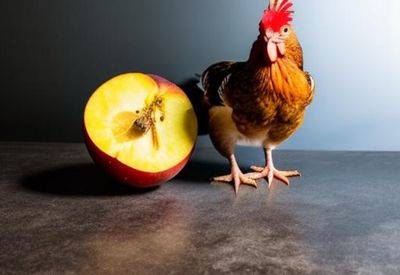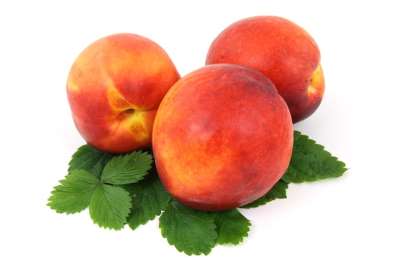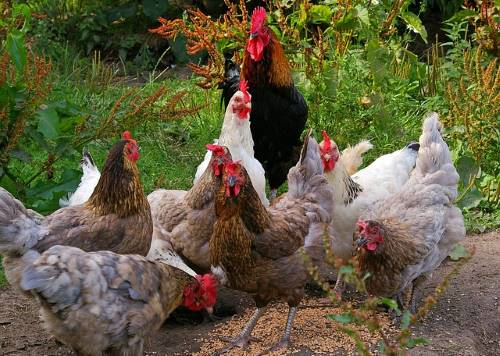Nectarines are delicious, sweet, and juicy stone fruits that are a favorite summertime snack for many people. But can chickens eat nectarines too? The answer is yes!
Nectarines are safe for chickens to consume and contain lots of nutrients. Nectarines are an excellent source of vitamins A and C, potassium, dietary fiber, and antioxidants. These vitamins and minerals help keep your chickens healthy and strong by supporting their immune system, promoting good vision and skin health, aiding digestion, boosting fertility, controlling cholesterol levels in eggs, and helping ward off infections.
However, you should be aware of the pit as it’s toxic to chickens, and nectarines should only be given as a treat. Let’s explore the benefits of feeding your flock nectarines and how to do it safely.

Can chickens eat nectarines?
In addition to all the amazing benefits of eating nectarines, they also provide hydration which is essential for birds during the hot summer months. While nectarines have many great qualities for your chicken’s health, one important thing to remember is to always remove the pit before giving them to your flock!
The pit can cause serious digestive issues if ingested by a chicken, so it’s best to avoid that risk altogether by removing it before feeding them to your birds.
Just like with anything else you feed your chickens, moderation is key when it comes to nectarines. You don’t want to overfeed them as this could lead to nutritional imbalances or obesity in some cases. A few pieces per day (or every other day) should be enough for most flocks, but you always want to monitor their intake in case some birds tend to go overboard with treats.
It’s also important not to make up more than 10% of their overall diet with treats like nectarines, so supplement the rest with healthy grains or feed pellets designed specifically for chickens.
[ChickenAffiliate]
The benefits of eating nectarines for chickens
Now we will explore the great benefits of feeding nectarines to your feathered friends. You might be surprised to learn that these juicy fruits have a range of positive side effects for your flock.
A Feast Fit for Your Flock
Nectarines are an excellent addition to your chicken’s diet, adding variety and excitement to their daily dining experience. Chickens enjoy a good peck at soft fruits and will gladly consume sweet, juicy nectarines.
The sensory pleasure and different flavors they provide are fun, refreshing, and mentally stimulating for your birds. Variety in their diet helps to keep them engaged and ultimately happier overall.
The Nutritional Bonanza
Nectarines are loaded with essential nutrients such as vitamins A, E, and C, potassium, and fiber. These components have numerous health benefits: Vitamin A promotes growth and boosts the immune system, while Vitamin E acts as an antioxidant, protecting cells from damage.
Vitamin C is essential for forming collagen, which helps maintain the health of your chicken’s skin, feathers, beak, and comb. Potassium is crucial for maintaining fluid balance and regulating heart and muscle function. Last but not least, fiber aids digestion, keeping everything running smoothly for your favorite egg layers.
An Immunity Booster
It’s no secret that healthy chickens are less susceptible to illness. Giving your chickens an immunity boost through a diet containing nectarines can help keep them free from diseases and infections, resulting in fewer veterinarian visits and more fun on the farm.
The vitamins, antioxidants, and potassium in nectarines contribute to a stronger immune system, making it easier for your poultry pals to fend off bacteria, parasites, and viruses.
Healthy, Happy Hens
In addition to promoting physical health, a nutrient-rich diet, including nectarines, can improve your chickens’ overall well-being. Nectarines contribute to immune systems and collagen formation, ensuring your hens have healthy-looking feathers, beaks, and combs.
When chickens feel good on the inside, it can help them feel good on the outside, boosting their confidence and social behavior amongst the flock. A confident and contented chicken helps maintain a more harmonious living environment.
Saving the Planet and Your Pennies
Feeding leftover or slightly bruised nectarines to your chickens is a fantastic way to reduce food waste and, in turn, save on feed costs. Your flock will be thrilled with the treat, and you’ll feel a sense of accomplishment from knowing that you’ve contributed to a more sustainable planet. It’s a win-win for both you and your chickens!
Things to watch out for when feeding nectarines to chickens

While nectarines are a healthy option for your chickens, there are a few things you need to watch out for. Let’s dive in and explore what you should consider when feeding your chickens nectarines.
Opt for Organic Whenever Possible
If possible, opt for organic nectarines when feeding them to your chickens. This will ensure that the nectarines are not sprayed with chemicals or pesticides that could harm your birds.
If organic is not an option, thoroughly wash the nectarines before giving them to your chickens.
Watch Out for Pits
One thing you need to remember is that all stone fruits, including nectarines, have pits. These pits can present a choking hazard for your chickens if they are not removed before being fed. Ensure the fruit’s pits are removed before giving it to your birds.
It is also important not to feed large pieces of fruit as they can be difficult for the chicken’s digestive system to process. Cut the fruit into small pieces or mash it up to make it easier for them to eat and digest.
Go Easy on Sugar Content
While fresh fruit like nectarines can benefit your birds, remember that some fruit is high in sugar and should be given sparingly. Nectarines fall into this category, so make sure you only give them as an occasional treat and limit how much they consume at one time.
Too much sugar can lead to health problems such as digestive issues and weight gain which can be detrimental over time.
How often should chickens eat nectarines?
Integrating a variety of treats into your chickens’ diet can greatly enhance their overall well-being and happiness. Nectarines, for instance, make a great occasional treat for our delightful feathered friends. However, it’s crucial to remember that such treats should not comprise their daily meal plan.
It’s best to keep nectarines and similar snacks to a maximum of 10% of their diet. By striking the right balance, you’ll ensure your chickens receive the necessary nutrients to remain healthy while also letting them indulge in the succulent and nutritious goodness that nectarines offer.
Remember, moderation is key to maintaining a thriving coop of happy and healthy chickens.
How to prepare nectarines for feeding to chickens

Discovering the many benefits of feeding nectarines to your chickens is a great way to enhance their diet and boost their overall health. But how exactly should you prepare these delicious fruits for your feathered friends? This comprehensive guide will walk you through the simple steps of prepping nectarines to make them the perfect treat for your chickens.
Wash the nectarines
First and foremost, always start by washing the nectarines thoroughly. This essential step ensures that any dirt, bacteria, or chemicals that might be present on the fruit’s surface are removed. After all, we want our chickens to enjoy a healthy and clean treat!
Use water to rinse each nectarine, gently rubbing its surface to remove any visible dirt or debris. This will leave you with pristine fruits ready for your chickens’ consumption.
Chop into small pieces
While chickens enjoy pecking at their food, making it easier for them to consume the nectarines is essential. To do this, chop the whole fruit into small, bite-sized pieces that your chickens can easily manage.
Not only will this help prevent choking hazards, but it will also ensure that each bird in your flock gets a fair share of the fruity goodness.
No need to peel them
When preparing nectarines for chickens, there’s no need to worry about peeling the fruit. The nectarine skin is entirely safe for chickens and offers nutritional benefits such as fiber.
Instead of going through the hassle of peeling each fruit, proceed to the next step after chopping them into smaller pieces.
Remove the pit
Removing the pit from each nectarine before feeding it to your chickens is crucial. The pits of stone fruits like nectarines contain small amounts of cyanide, which can harm your birds if consumed. Carefully slice around the pit while you chop the fruit, and discard the pits safely.
Monitor their consumption and remove any uneaten pieces
Once you’ve prepared the nectarines, it’s time to offer these delightful bites to your chickens. Monitor their consumption and remove any uneaten pieces after a reasonable period. Leaving the fruit to rot in your chickens’ living area is unhygienic and can also attract unwanted pests.
By watching your flock’s eating habits, you can ensure they fully enjoy their fruity treats without causing any disruptions in their environment.
Can baby chickens eat nectarines?
Baby chicks can indeed enjoy nectarines. Just be mindful of the sugar content in these lovely fruits, as it could lead to some unhealthy weight gain in your little feathery friends.
However, don’t hold back too much – these chicks won’t be babies forever, and once they’re adult chickens, they can indulge in more of these delightful nectarine nibbles. So treat your baby chicks to a delicious, fruity snack to brighten their day.
What other fruits can chickens eat?

Chickens may love nectarines, but they are far from the only fruit that can provide a tasty treat for your feathered friends. Here are five other fruits chickens can happily gobble up, each offering a unique variety of nutrients and flavors.
Peaches
Sweet, juicy, and fragrant, peaches are another delightful treat for your chickens. Not only do they taste delicious, but they also provide essential vitamins and minerals to support your chickens’ health.
Additionally, peaches are a good source of antioxidants, which can help protect against free radicals and boost the immune system. Remember to remove the pit when feeding your chickens peaches, which poses a choking hazard.
Read More: Can Chickens Eat Peaches? 5 Important Benefits
Cherries
Cherries are the cherry on top of your chickens’ diet! These flavorful little fruits are packed with vitamins, minerals, and antioxidants that can benefit your chickens’ overall health.
Moreover, some studies suggest that cherries may help reduce inflammation and lower cholesterol levels. Just like with peaches, removing the pits before feeding cherries to your chickens is essential, as they can be toxic when ingested.
Read More: Can Chickens Eat Cherries? 6 Fantastic Benefits
Mango
Mangoes are a tropical treat that most chickens can’t resist. These succulent fruits are loaded with vitamins A and C and are a rich source of dietary fiber, keeping your chickens’ digestive system in good shape.
In addition, the high water content in mangoes will help prevent dehydration during the hot summer days. Remember to peel off the skin and remove the large seed before serving mango to your chickens.
Read More: Can Chickens Eat Mango? 5 Amazing Benefits
Plums
If you’re looking for a tasty treat your chickens will plum love, look no further than plums. These stone fruits are rich in nutrients and often lower in sugar compared to other fruits, making them a healthier option.
Plums also contain a reasonable amount of fiber, which can help digestion. As with other stone fruits, it’s important to remove the pits before giving plums to your chickens.
Read More: Can Chickens Eat Plums? 5 Excellent Benefits
Coconut
Coconut may not be the first fruit you think of when it comes to feeding chickens, but it can be an excellent addition to their diet. Coconut flesh is rich in healthy fats and boosts your chickens’ energy.
Additionally, coconut oil has been reported to have antimicrobial properties, which may help promote your chickens’ overall health. While it may take extra effort to crack open a coconut, your chickens will surely appreciate the unique and tasty treat.
Read More: Can Chickens Eat Coconut? 5 Awesome Benefits
Can chickens eat nectarines – final thoughts
In summary, nectarine fruits are a great treat for chickens as long as they are given correctly. They contain many vitamins and minerals that help keep your flock healthy while providing extra hydration during hot summer days.
Remember that the pits can be toxic, so ensure they are removed before feeding them out. As with any treat you give your flock though – moderation is key. Give no more than a few pieces per day (or every other day) at most so they don’t become overly reliant on treats instead of their regular feed pellets or grains.
With proper care and caution when feeding nectarines out to your chickens – you’ll be sure to have happy hens all year round.
Related Articles:
